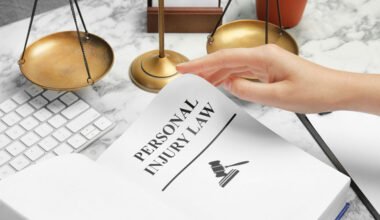Want the inside scoop on how insurance companies handle personal injury settlements?
Insurance companies are NOT your friends. They are multi-billion dollar businesses with one goal in mind – paying out as little as possible on your claim.
This article will help you cut through the hype so you can understand what’s really going on when you’re making a claim after an accident.
From their tactics and motivations, to how to handle them during negotiation, we’ll break it down in a way that you can use right now.
Here’s what we’ll cover:
- How Insurance Companies Really Operate in Personal Injury Cases
- The Different Types of Coverage That Affect Your Settlement
- Why Insurance Companies Rush to Settle Claims
- How to Navigate Insurance Company Tactics
How Insurance Companies Really Operate in Personal Injury Cases
Before we dive into their tactics, here’s something you should know…
You might think of insurance companies as middlemen processing claims. In reality, they are major players in the multi-billion dollar industry of personal injury law.
In fact, 95% of personal injury cases settle before trial. The insurance company usually negotiates directly with the victim on the defendant’s behalf.
How do they operate?
Insurance adjusters are professionals who conduct investigations, determine liability, and calculate settlement amounts on behalf of insurance carriers.
This is a skilled profession, with training programs dedicated to insurance adjuster techniques and tricks.
They will comb through police reports, medical records, witness statements and photos to look for holes in your claim.
Many adjusters specialize in finding pre-existing conditions or downplaying the severity of injuries. They are well versed in medical terminology and treatment options.
So don’t be fooled when they offer prompt and “efficient” service. The adjuster’s primary goal is to pay out as little as possible.
If you find yourself involved in a personal injury legal case, it can be invaluable to have the assistance of Wisconsin personal injury attorneys who know the insurance game.
The Different Types of Coverage That Affect Your Settlement
Coverage matters when it comes to settling personal injury claims.
But not all coverage is created equal…
Here’s the difference between the common types of coverage that can impact your settlement:
- Liability insurance covers bodily injury or property damage to others when the policyholder is at fault. Key point: There are policy limits that cap potential recovery. The insurance company is NOT obligated to pay beyond the policy’s liability coverage amount, even if the actual damages exceed it.
- Uninsured/Underinsured Motorist (UM/UIM) coverage steps in when you are injured by a driver with insufficient insurance. This is actually your own insurance policy protecting you from underinsured drivers.
- Medical Payments (MedPay) and Personal Injury Protection (PIP) cover medical expenses regardless of fault in an accident.
- Health Insurance can be used to pay for accident-related medical expenses.
Coverage type really does matter because the different policies interact in settlement negotiations.
Why Insurance Companies Rush to Settle Claims
Insurance companies often want to settle claims as quickly as possible, sometimes even immediately after an accident.
Here are a few of their reasons…
- They want to pay out before the full extent of your injuries is known. Many serious injuries don’t manifest for days or weeks. If they settle early, insurance companies can avoid paying for future medical treatment, lost wages, and other damages that may arise.
- They want to settle before you hire a lawyer. In fact, 70% of people who held out for better offers received better results after hiring an attorney. The average difference in offers was $30,700.
- They want to avoid the unpredictability of a jury verdict and the mounting litigation costs.
Insurance companies are in business to turn a profit, and that means paying out as little as possible in claim settlements.
How to Navigate Insurance Company Tactics
Insurance companies deploy a variety of sophisticated tactics designed to confuse you and minimize the settlement amount.
The most common ones include:
- Making a lowball offer right off the bat. This is how they “test the waters” to gauge your response.
- Requesting a recorded statement from you about the accident. Don’t ever agree to this. Recorded statements are traps for victims who inadvertently admit fault or misremember important details.
- Questioning your medical treatment. Insurance adjusters are trained to look for anything they can use to deny or downplay the severity of your injuries. Don’t be intimidated by their questions.
- Pressure tactics like creating artificial deadlines. The insurance company knows that victims want quick resolutions and they will push to get you to accept an unfair settlement as soon as possible.
Pressure and artificial deadlines are techniques used by insurance companies to trick you into lowball settlements. The deadline is usually meaningless. It is not a real deadline.
When You Need Professional Legal Help
You don’t need a lawyer for every small accident or injury case. But there are specific situations where professional legal help is crucial:
- Serious injuries with high medical bills. If the insurance company is disputing liability or the case is complex, an experienced attorney can make all the difference.
- Insurance companies denying claims outright or lowballing offers.
Attorneys have the knowledge and experience to properly value your claim. And you need an advocate to level the playing field against a billion-dollar corporation.
The fact is…
Insurance companies have armies of lawyers, investigators, and experts who are experts at lowballing settlements. Don’t go it alone.
Wisconsin’s personal injury law firms have skilled attorneys who know how to fight back.
The Settlement Process Explained
Filing an insurance claim after an accident is never a pleasant experience. But being informed about the process will help.
Here are the basic steps:
- The claim is filed with the at-fault party’s insurance company, which then assigns an adjuster to the case.
- The adjuster reviews police reports, medical records, witness statements and photos to conduct a thorough investigation. They will calculate what they believe your case is worth based on company software, policy limits and industry guidelines.
- Negotiation begins. Your attorney will make an initial demand well above what they expect the case to settle for in order to create a negotiation room. Counteroffers will be made until a final agreement is reached.
- The victim signs a release form waiving their right to future legal claims on this incident in exchange for the agreed payment. This finalizes the settlement.
Do not rush this process. It often takes weeks or even months of negotiations to get to the best possible settlement agreement. Don’t settle early for far less than you deserve.
What Insurance Companies Don’t Want You to Know
Here’s something insurance companies wish you didn’t know…
The average auto liability claim for bodily injury is $26,501. But not all cases are average.
Insurance companies use software programs to spit out generic settlement offers based on formulas. But computers can’t understand unique circumstances or the true value of pain and suffering.
Here’s the bottom line…
Insurance companies may seem like faceless corporations, but their employees make mistakes all the time. The more you know about the process, the better you can protect yourself and your rights.
Insurance companies don’t want you to know this, but their initial settlement offers are almost never close to the true value of your claim.
Putting It All Together
Insurance companies are not your friends. They are for-profit businesses that will always work to pay out as little as possible on your claim.
Understanding their operating tactics, coverage types, when to hire a lawyer, the settlement process and their dirty little secrets can help you cut through the noise and make the right decisions.
The key points to take away from this article are:
- The majority of settlements occur outside of court, so negotiation skills are key.
- Insurance policy limits can restrict your maximum recovery amount.
- Insurance companies are motivated to settle before the full extent of injuries become known.
- Working with a lawyer usually results in a much higher settlement than going it alone.
Don’t let an insurance company take advantage of you when you’re at your most vulnerable after an accident. The more you know, the more power you have.



